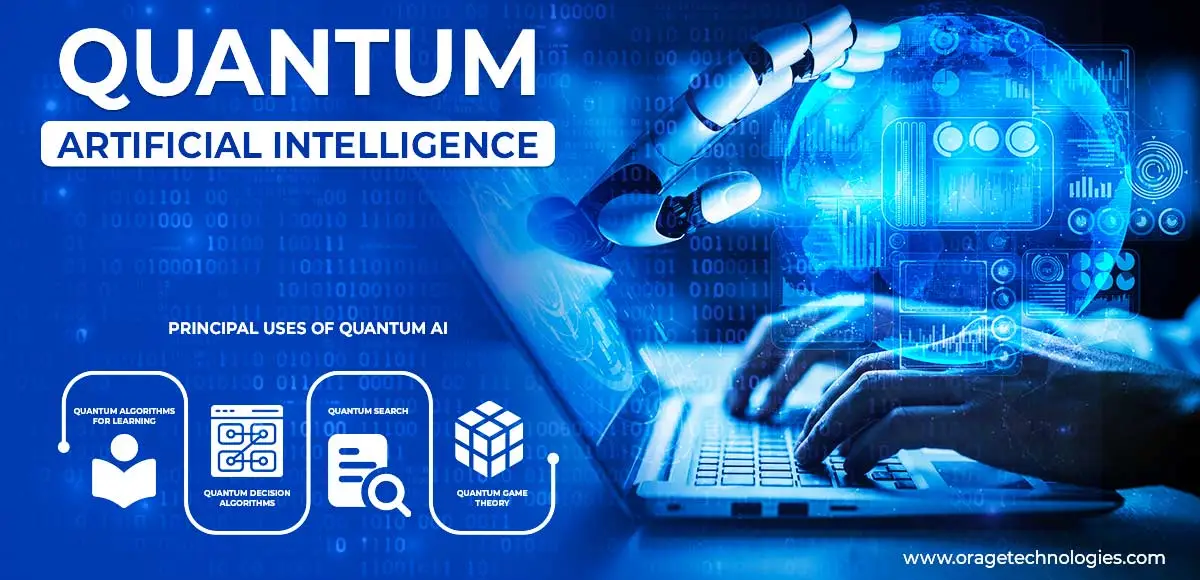
Divya Stuti, with over 5 years of experience in Digital Marketing & Content Writing, has a knack for turning complex Marketing strategies, trends, and jargon...
We live in the technology age, but still, there are plenty of things to come. In recent years, big companies have been taking small but essential steps. Quantum Computing is one of them, which is set to revolutionize the world. The following choice of possible applications will affect everything from healthcare to mobility.
Quantum computers would be like the Albert Einstein of computing in a binary world comprising of ones and zeros. With exceptional electronic brains, they can accomplish tasks that are almost impossible for basic computers to handle.
Quantum Computing Explained:
Quantum Computing is a multi-sided field consisting of aspects of mathematics, computer science, and physics. They use quantum mechanics to crack difficult issues faster than any traditional computer. The field includes application development and hardware research.
Quantum computers have the ability to resolve specific types of issues faster than any traditional or classic computer. It takes advantage of quantum mechanical effects, including quantum and superposition interference.
Quantum computers can offer a speed boost in some applications, including machine learning (ML), simulation, and optimization of physical systems. Ultimate use cases can be the optimization of the portfolio of the simulation of chemical systems or in finance. It helps to solve the currently impossible issues for even the supercomputers on the market.
What Is Quantum?
The “Quantum” in Quantum Computing means the quantum mechanics that the system utilizes to calculate outputs. It is the smallest possible distinct unit of physical property in physics. It normally refers to properties of subatomic or atomic particles, such as photons, electrons, and neutrinos.
What Is A Qubit?
The basic unit of information in Quantum Computing is known as “Qubit.” Qubits are similar to the bits in classical computing, but they act very uniquely. Bits in classical computing are binary and can able to hold only a position of ten or one. On the other hand, Qubits can hold a superposition of every possible state.
Why Do We Need Quantum Computers?
When engineers and scientists face difficult issues, they turn to supercomputers. These are large classical computers with thousands of classical GPU and CPU cores. These can run vast calculations and advanced AI (artificial intelligence). However, supercomputers are binary code-based systems dependent on 20th-century transistor technology. They struggle to solve specific kinds of issues.
Complex problems are those with many variables interacting in a complicated way. Customizing the behavior of individual atoms in a molecule is a complex issue because of all the various electrons interacting with each other.
Identifying slight fraud patterns in new physics or financial transactions in a supercollider is also complex. We do not know how to solve some complex problems with classical computers at any scale.
What Is Quantum Computing Used For?
Quantum computing can contribute significantly to the fields of military affairs, finance, security, and intelligence. Other than these, it also contributes to drug design and discovery, Artificial intelligence, polymer design, big data search, and aerospace designing.
Quantum computers can also be used to enhance the secure sharing of information. It also improves radars and their capability to determine aircraft and missiles. Additionally, it is expected to help the environment and keep the water clean with chemical sensors.
Some possible benefits of quantum computing are:
- Finance: Financial institutions can use quantum computing to develop more efficient and effective investment portfolios for institutional and retail clients. They can focus on generating better trading stimulators and enhance fraud detection.
- Healthcare: Healthcare industries can use quantum computing to create genetically-targeted medical care and new drugs. It can also power more advanced DNA research.
- Cybersecurity: For more powerful online security, quantum computing can aid in developing better data encryption. Also, some ways to use light signals to identify intruders in the system.
- Transport and Mobility: It can be used to create safer and more efficient aircraft and traffic planning techniques.
Why Is Quantum Computing Faster?
A classical system or computer might be great at tough tasks like sorting through a huge database of molecules. But it will surely struggle to solve more complex tasks, like simulating the behavior of molecules. Quantum computers are faster than classical ones, and we are going to describe everything below.
In today’s world, if scientists want to know how a molecule will react, they have to experiment with it and synthesize it in the actual world. Similarly, if they want to know how a subtle tweak can impact its behaviors, they typically need to synthesize the latest version and run the experiment from the first. This time-consuming and expensive method checks the progress in fields as diverse as semiconductor and medicine design.
A classical supersystem might try to replicate molecular behavior with brute force. It can do this by leveraging various processors to explore many possible ways every part of the molecule might react. However, the supercomputer slows down as it moves past the most straightforward, simplest molecules available.
No system has the working capacity to handle all the possible arrangements of molecular behavior using any general methods. Quantum algorithms create multidimensional computational spaces by taking a new approach to these sorts of complexities. This results in a much more effective way of solving complex issues like chemical simulations.
Industrial chemists are already finding ways to integrate quantum practices into their work. Global shipping companies, engineering firms, and financial institutions, among others, are searching for use cases where quantum computers can solve essential problems in their field.
How Quantum Computing Works?
How do quantum computers work? Today’s computer systems use binary codes to encode data. Such binary framework runs on processors which use transistors for computations. These act as computer circuitry switches, creating 0s and 1s process logic computing. However, these 0s and 1s are replaced by bits when it comes to quantum computers. These are also called qubits, encoding quantum information and processing various quantum states.
Key components which help to drive the quantum computing model are:
Qubits:
Quantum computing works on qubits. These symbolize quantum-mechanical systems that can take up various quantum scales and values exponentially beyond the conventional zeros and ones. For instance, a 2-qubit system can do four concurrent computations, while a 3-qubit does eight, and a 4-qubit system does sixteen.
Superposition:
Superposition defines the quantum system as being in various states at the exact time. For instance, when you flip a coin, it ends up as heads or tails. However, if we see the state of a coin when it is in the air, it holds both heads and tails.
Similarly, quantum particles, like electrons, are in a position of quantum superposition until they are effectively measured. As a result, the “unpredictability” factor is taken into consideration in quantum computers.
Entanglement:
Entanglement means the entangling of two or more qubits by developing a correlation between the two. When they are entangled, any change to one of those qubits invariably affects the others without exception.
For instance, let’s say you introduce an extra qubit to a sixty-qubit computer. In such a scenario, the quantum system can evaluate 260 states at the same time. Adding a qubit with the entanglement property allows the computer system to perform faster than the ordinary. Hence, algorithms of quantum computing use entanglement to process faster data.
Interference:
Interference is the process of controlling the states in a quantum machine by diminishing or reinforcing the wave operations of quantum particles. As a result, quantum states lead to a correct output that can be boosted. On the other hand, one can eventually cancel the states, producing a wrong output.
Coherence:
Quantum machines cannot perform well in noisy environments. They get affected by external noise as the superposition state, which is maintained by qubits, is disturbed. This leads to many errors in computation. Moreover, quantum only keeps information for a short period of time. Hence, performing the computational duties while the information still exists is essential.
Future Of Quantum Computing:
Quantum computing is developing rapidly, and its future is full of exceptional possibilities. Several possible directions in the future are listed below:
- Improved Hardware: One of the central challenges is developing hardware that can steadfastly perform quantum computations. In order to lessen the effects of decoherence and noise, researchers are creating better processors and also enhancing the techniques of error correction.
- Applications In Material Science and Chemistry: By impersonating complex chemical interactions and reactions that are impossible or tough to model with classical systems, quantum computing is able to significantly accelerate new drug and materials discovery.
- Improvements In Cryptography: Quantum computing can break many encryption algorithms used to secure personal information today. However, many researchers are also working on creating new encryption methods that are quantum-safe. It will help to resist attacks by quantum computers.
- Machine Learning and Optimization: Quantum computing can solve optimization issues intractable for classical systems, such as those discovered in supply and logistics chain management. Quantum machine learning can also particularly improve pattern recognition and data analysis.
- Hybrid Classical-Quantum Computing: Various applications may need a combination of quantum and classical computing to achieve the best results. Many researchers are developing techniques for integrating quantum and classical algorithms to benefit from every approach’s strength.
Final Line:
As quantum computing is reaching new heights, a world currently science fiction will become a reality. We will be able to process huge amounts of data enormously fast, enabling unthinkable simulations. As a result, a new and latest level of Artificial Intelligence will be possible to speed up advances in renewing energy technologies, disease management, and many other things. In a world where energy costs are decreasing rapidly, we will live healthy and longer lives!
Frequently Asked Questions (FAQs):
Ques: What is quantum computing in simple words?
Quantum computing is a technology which is rapidly emerging. It harnesses the laws of quantum mechanics to resolve issues that are more complex for classical computers.
Ques: What does NASA use quantum computers for?
To address machine learning problems and complex optimization in NASA’s aeronautics, space exploration, and Earth and space sciences missions.
Ques: Who invented the quantum computer?
In 1985, David Deutsch was the one who showed that a quantum computer could effectively simulate the behavior of any system.
Ques: Do quantum computers exist now?
Yes, there are quantum computers in supercomputer centers, scientific laboratories, universities, etc.
Also Read: 10 Best Free AI Art Generator for 2025

Divya Stuti, with over 5 years of experience in Digital Marketing & Content Writing, has a knack for turning complex Marketing strategies, trends, and jargon into interesting and easy to digest blog posts. Whether she’s breaking down the SEO, Social Media or decoding campaigns, Divya knows how to make marketing feel exciting and easy to understand. Armed with a sharp eye for strategy and a storyteller’s instinct, she writes with clarity, creativity, and just the right dose of wit.
More Posts

